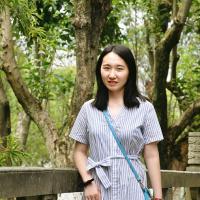
Agroecology Reading time 5 min
Lin Kang, between travelling and phenotyping
Published on 22 November 2021
What made you come to INRAE?
Lin Kang: “I arrived in France 5 months ago in May 2021 to join the INRAE Occitanie-Toulouse center. Just before that, I spent two years in the Netherlands at Wageningen University and Research as an environmental science student, studying international land and water management to finish my Master’s degree. During the lockdown period in the Netherlands, some colleagues were sharing job offers and one day, I read about an offer in crop modelling. It was about a project for an application to North China plains and southern France, and my research concerned exactly these regions.
I immediately contacted the persons in charge and they arranged a Skype interview with 4 teachers (Chinese and French). Two weeks later I received a positive answer. From that moment, it was the beginning of a whole new adventure in France! As I said, in May 2021, I joined the AGroecology, Innovations & teRritories unit and moved to Toulouse. My thesis director Philippe Debaeke and my colleague Claire Jouany helped me to find accommodation, and I now live with three French students.
What is your research project?
L.K: “Our goal is to design and evaluate diversified cropping systems to achieve both productivity and sustainability in North China plains and southern France. More specifically, it is to reduce water and nitrogen input while ensuring crop yields. Due to the demand for protein self-sufficiency for both countries, we selected soybean as the main research crop with a focus on double cropping. The functional response of a range of soybean varieties will be screened by phenotyping facilities. To explore the plant response to water and nitrogen availabilities, the STICS crop model developed by INRAE will be adopted to simulate potential soybean-based cropping systems under different climates (present and future) and crop managements. The STICS model is a dynamic, generic and robust model for simulating the soil-atmosphere-crop system. It is currently adapted to nearly twenty cultivated species, annual, perennial, herbaceous or woody."
What surprised you about how we work in France?
L.K: “The biggest surprise in France is the close connection between colleagues. When I was in the Netherlands or even China, it was normal to go out or eat alone. After coming to France, I once went to the cafeteria alone. My colleagues saw me and asked why I wasn’t eating with them. Then I realized that doing things together is important here. To some extent, influenced by my colleagues, I am now more considerate than before.”
What do you like to do in your free time?
L.K: “In my free time, I usually watch documentaries or movies. I actually enjoy being alone sometimes, but my friends worry about me, so they sometimes invite me to parties, and I definitely go."
How do you feel about living so far from your family?
L.K: "I went to boarding school when I was 13 and since then I have no longer lived with my parents. We always support and respect each other's decisions, so the relationship has always been very harmonious.
In China, to describe this kind of relationship, we use a specific expression: "distance produces beauty".
• Since 2021 - PhD student at INP Toulouse – Agrosystems, Ecosystems and Environment
• 2018 - Master’s degree in International Land & Water Management, Wageningen University & Research, the Netherlands
• 2014 - Bachelor’s degree in agricultural water conservation engineering, Sichuan Agricultural University, China
